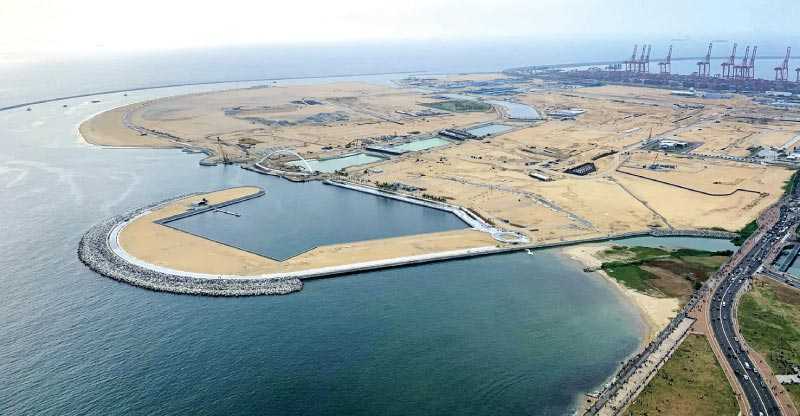Monday Jan 19, 2026
Monday Jan 19, 2026
Monday, 19 April 2021 00:25 - - {{hitsCtrl.values.hits}}

 It is hypocritical for a political coalition that demonised the then Government and minorities by vigorously promoting the principle of ‘one country, one law’, to then propose to carve out the Port City development as a geographical area exempt from many of the laws and practices prevalent in the country. Those who sow the wind, reap the whirlwind. Because of this hypocrisy, the Government has great difficulty doing what it knows is the right thing for the country.
It is hypocritical for a political coalition that demonised the then Government and minorities by vigorously promoting the principle of ‘one country, one law’, to then propose to carve out the Port City development as a geographical area exempt from many of the laws and practices prevalent in the country. Those who sow the wind, reap the whirlwind. Because of this hypocrisy, the Government has great difficulty doing what it knows is the right thing for the country.
It is hypocritical for members of the dominant party in the previous Government (now split) to protest vociferously against the special treatment proposed for investors by the Colombo Port City Economic Commission Bill. They full well know the dysfunctions of the investment environment in Sri Lanka. The then Government was working on a bill on the same lines. There was discussion on placing the financial city within the jurisdiction of the English courts then.
It is not hypocritical for the Bar Association and other interveners to object to the proposal to establish an International Commercial Dispute Resolution Centre and to the associated legal workarounds. But it is wrong and self-serving. Members of the legal profession, more than anyone else, should know how dysfunctional the country’s legal system has become.
At the 47th Annual Convocation of the Bar Association, the Minister of Justice said that the average time to enforce a commercial contract in this country is 1,318 days (3.5 years). It is said to take one year to get a date for an appeal to be fixed for hearing on a criminal matter.
All of us who worked on improving Sri Lanka’s rank in the Ease of Doing Business Indicator know that the legal-system-related factors are a major factor in Sri Lanka being relegated to the back of the class. Poor performance in resolving insolvency and enforcing contracts are major contributors to Sri Lanka being ranked 99th out of 190 countries. On enforcing contracts, we are ranked 164th.
So, the previous Government was right when they considered placing contracts of investors in the Port City under English commercial courts. The experts who crafted the present bill were right in making arbitration by the International Commercial Dispute Resolution Centre mandatory and allowing for a fast-track engagement with the Sri Lankan courts as needed. Commercial arbitration is nothing new in Sri Lanka. To argue that it violates our Constitution is a little farfetched.
But of course, professional associations rarely allow logic and the national interest to come in the way of the financial and related interests of the members. The Sri Lankan legal system is one of the worst in the world, partly because the powerful private interests of the legal professionals are given priority over the interests of litigants and the country. It is not in their interest to admit how broken the system, they profit off, is. The Colombo Port City Economic Commission Bill is an indictment of that system. Lawyers, individually (as a prominent politician/President’s Counsel so vividly demonstrated) and collectively, are likely to oppose it.
The Port City bill is a workaround. It is needed because our systems are broken. President J.R. Jayewardene established the Greater Colombo Economic Commission (predecessor to the Board of Investment) as a workaround solution, by Act No. 4 of 1978 because our systems were a barrier to the attraction of needed foreign investment. We have the Katunayake and Biyagama zones and the various value-added manufacturing industries that are keeping our economy afloat, thanks to that workaround.
The tragedy is that 43 years later we are still doing workarounds. We need these stopgap measures, but we need to give the highest importance to fix all the systems that affect all our citizens, not just the foreign investors. Despite the specific mention of the doing business indicator in the Port City Commission Bill, the indicator is not done for enclaves but for the country as a whole. Improving the key systems across the country is what others are doing. India is now more than 30 places ahead of Sri Lanka, thanks to dedicated task forces. China is ranked 31st, more than 30 positions ahead of India and more than 60 ahead of Sri Lanka. I invite the readers to look at how well our competitor, Viet Nam, is doing.
If we do not improve the ease of doing business for all, we will be overtaken by Pakistan soon. They are taking concerted action to improve performance on the components and are now just nine places behind. Do the work around, but for God’s sake, focus on system improvements throughout. Define threshold levels in the Port City Bill itself when the workarounds can be discontinued, and we can celebrate living in a country where the legal system does not require bypass.